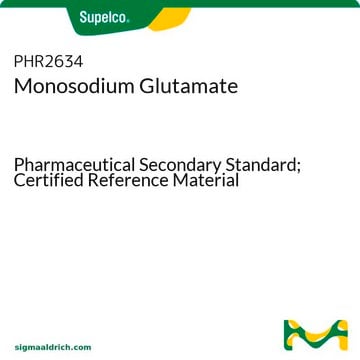03835
γ-Aminobutyric acid
analytical standard
Synonym(s):
3-Carboxypropylamine, 4-Aminobutanoic acid, GABA, Piperidic acid, Piperidinic acid
About This Item
Recommended Products
grade
analytical standard
Quality Level
Assay
≥97.0% (HPLC)
shelf life
limited shelf life, expiry date on the label
analyte chemical class(es)
amino acids, peptides, proteins
technique(s)
HPLC: suitable
impurities
≤1.0% water
mp
195 °C (dec.) (lit.)
application(s)
cleaning products
cosmetics
flavors and fragrances
food and beverages
personal care
format
neat
SMILES string
NCCCC(O)=O
InChI
1S/C4H9NO2/c5-3-1-2-4(6)7/h1-3,5H2,(H,6,7)
InChI key
BTCSSZJGUNDROE-UHFFFAOYSA-N
Looking for similar products? Visit Product Comparison Guide
General description
Biochem/physiol Actions
Storage Class Code
11 - Combustible Solids
WGK
WGK 3
Flash Point(F)
Not applicable
Flash Point(C)
Not applicable
Choose from one of the most recent versions:
Already Own This Product?
Find documentation for the products that you have recently purchased in the Document Library.
Customers Also Viewed
Our team of scientists has experience in all areas of research including Life Science, Material Science, Chemical Synthesis, Chromatography, Analytical and many others.
Contact Technical Service








